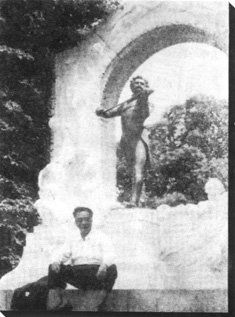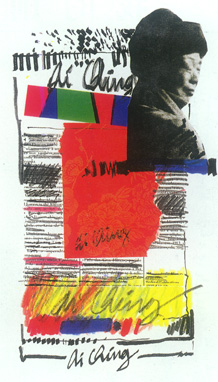RC is honoured to introduce to the reading public, in this first issue, Ai Qing, who is considered to be the greatest living poet in China, a country the size of Europe inhabited by one billion people.
We shall, in our future issues, have the opportunity of contributing to a wider and deeper knowledge of Ai Qing - and by so doing, we shall be being true to the vocation which calls us together: laying some bridges to the universal meeting of Cultures.
This introduction will coincide with the publication sponsored by the 'Instituto Cultural de Macau', of Ai Qing's poetic anthology in a Portuguese edition. Translated and divulged in English, French, and Spanish, now rendered into Portuguese, the fifth spoken language in the world, the poetical works of Ai Qing can claim a universal dimension.
Yet, they did possess such dimension already, though under the reference of a different cathegory, other than plain quantity.
A poet of the people, of beggars, "of all who struggle in utter misery", of the immense choir of the victims of "lie and oppression" Ai Qing is possessed by that evoking and enchanting verbal strength which draws us closer, fraternal and sympathetic, to the small worlds that move him.
The small human theatre of an obscure village, the wretched peasant emerging from within the icy mist of a road lost in the heart of China, they all suddenly concentrate, by his descriptive and metaphoric power, to the dimension of Universal Man.
 Ai Qing in Austria(June,1979)
Ai Qing in Austria(June,1979)
After reading 'Rio Dayen', who will fail to recognize, and be moved by, the character in that cinematography, Woman, the Lady of the Milk and the Mysterial Interceder of Love, the Guardian Angel of Life and the Prophetess of Fates, the Woman-Always, the timeless archetype of the Mother?
And what to say about "Bugler" the bride--groom of virgin-dawn, an alchemist of elements inside the golden serpentine of his trump, the maestro of the roaring tumult of battles, the subtle breath ordering caos?
And what about the daily rising of the Sun, "the sea of waving life", the diurnal "re-birth of humanity", And "message from Dawn"?
For Ai Qing is not merely the sympathetic and revolted singer of "the oldest and the most necessitous nation in the World", "of cold and hunger", of "stupidity and superstition ", of all miserabilist, degraded, and exiled conditions of Man and of peoples.
Faithful to the ancient Wisdom of his Culture, the substantial and complementary polarization of the "Yin"and "Yang"principles is present in his poetry. In him does the nocturnal side of the world predict and live with the northern pallor and the solar chant. His tavern-customers raise their blasphemous, drunken choir to the splendour of crystaline night.
He is the lucid and undoubting singer of day-light and re-birth of hope and peace - "the faithful companion of life/ up to the last breath ".
And, more than that, he is the "star--hunter", the inspired pilgrim of upward ways.
In the cosmological references of his poems one has the feeling of his being on the way to places where, in a platonic sense, he is supported by the compasses of great geometries. It is maybe with pure inspiration, perhaps not with doctrine, that Ai Qing emphasizes vision over the common application of archeological science, which has debased itself from the office of the highest ministry to the use of ancillary techniques belonging to other sciences. In his poems 'I do not believe in archeologists' he concludes: "There is but one key in the whole world to open the iron doors". And the poem intentionally called 'Road' closes with: "... And I have the impression that I find myself in the centre of the World".
A volcanic poet of poetry that is a gush of lines, an outpour of sudden inspiration, plenteous like Whitman and spontaneous like Neruda, Ai Qing's poems are meaningful in their total form, because in the cadence of his descriptive lines there always shine expressions of great poetry. For that reason and in order to fully emtpy himself of the stream inside him, he uses unrhymed verse and was thus the introducer and the divulger of modernism in China, after his stay in Paris and his meeting both with the Symbolists and with the main tendencies of the beginning of the century.
But Ai Qing's poetry cannot be understood independently of its relationship with his biography - that of an agitated, engaged, and precluded life.
Destiny soon left broken in his hands the orphean flute, a canorous bamboo which, upon long years buried underground, still did germinate and sprout anew. For his journey is a sombre "station of hell", lightened, at intervals, by the summery gush of his poems.
Ai Qing, the poet, was tempted by three demons: the false scent of the arts, the siren of politics, the appeal of the civil-servant way of life. He was, however, always blessed by inspiration and Poetry finally met him in that maze made up of so many corners.
He was able to utter the lamenting cry of having wasted away in "wandering" the best years of a man's life, from 19 to 25. But the painful lament of 25 years of silence and interdiction was only to be echoed in the innermost depth of his inspired, unrelieved heart.
There is no great poetry out of exile. But the main difference is whether it is our own exile or an imposed one. They can remain intact and the same, the boundaries of our retreat, but what starts to give some sense to proprietary freedom is knowing whether the signs which define them were set by ourselves or by our retractors.
It would be a poetic licence to say that the greatesst of Ai Qing's poems was the silence of his muted and despoiled 25 years. But one can be sure that, no one gaining in the process, greater than his condemnation is the one which falls upon his inquisitors.
76 today, Ai Qing is the mute, serene singer of his triumph, as one who came to find out that one of the ways of illuding the forces of death is to make life a game of clandestinities. And that within the exile one must build the walls of another exile - a coffin of silence and secrecy, a temple where to entertain visitations and keep the sacred fire.
Thus did Ai Qing serenely confirm the fate of a resistance hero, an anonymous hero of "hemingwayan" tenacity before the war of life.
In Chile, he compares himself to the rock which always emerges out of the stubborn assault of the waves. Later, he shall see himself in the crossing of a long tunnel, not knowing whether he will eventually find his way out. In 'Fossilized Fish', he will proclaim: "Life is a fight, and fight carries us further on". Comparing himself to the shapeless scum in 'Coal', he still casts the appeal for a radical adherence to life: "Please, set me on fire, set me on fire. "
"Like a photo that survived a fire/ Like a china piece after an earthquake/ Like the mast of a drowned ship emerging from the waters"- so did Ai Qing always rise again, an olive-tree branch upon deluges.

Not only with the ark of his poetry, but with his human living and thorough engagement, did he cross the whole present century, a time of greatness and wretchedness, of rise and fall, like a steady mountain between "the sound and the fury" at its feet, submerged in winter storms to soon bloom again in the spring season.
He is thus a living symbol of Life, the Man who lives with and sings some of the most permanent woes of the human condition, lovingly solidary with the condition of all created beings.
A pioneer of the opening of Chinese culture to Western patterns, Ai Qing is, today, one of the main representatives and agents of the contact of the Chinese people with the other peoples in the whole world.
Being still alive, he is an exponent of the oldest present Culture in the world, that of an enormous nation which is, for the first time in a lifetime of thousands of years, opening up an entering gate for the outside world in the walls of its isolation.
For all that - for the Poet and his Works, for the Man and what he stands for, for the historical opportunity of re-linking the most original and primeval Culture of the present Human generation to the brotherly universal congregation - for all this we have seen in Ai Qing the advisable candidate for the Nobel Prize in Literature.
From the Far East, we address our voice to those who will be solidary with our benign intention.•
start p. 45
end p.